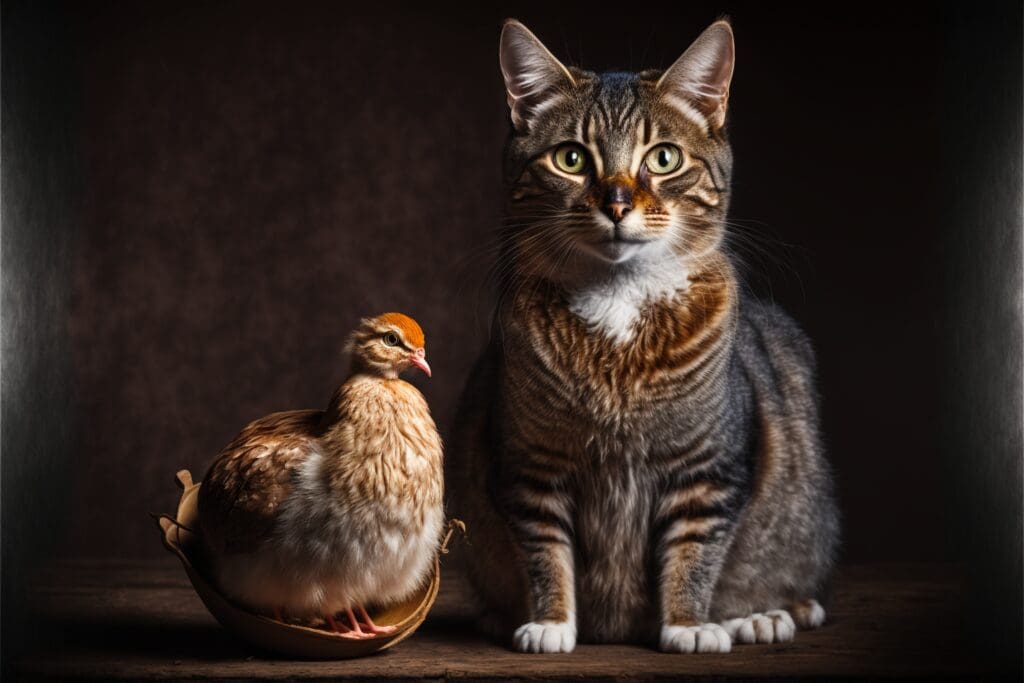Last Updated on January 10, 2023 by admin
Cats can enjoy the nutritional benefits of chicken gizzards and hearts as an occasional treat. It is important to be mindful of portion size as gizzards contain a high level of sodium and fat. Cats that eat chicken gizzards and hearts regularly should have the serving size monitored. Raw chicken gizzards and hearts are safe for cats to consume and provide quality protein to help maintain lean muscle mass. When preparing chicken gizzards and hearts for your cat, it is important to cook them thoroughly to avoid any potential food-borne illnesses. All-natural chicken gizzards sourced from USA family farms are packed with vitamins, minerals, and other important nutrients. Your pet will love these flavorful treats!
Eating Chicken Gizzards Benefits Cats
Cats may safely eat chicken gizzards and hearts only occasionally due to the sodium and fat content. However, they can still benefit from eating chicken gizzards in moderation. Eating chicken gizzards will provide your cat with quality protein that helps maintain a lean muscle mass, as well as vitamins including B and C, minerals, and essential fatty acids. Moreover, the texture of chicken gizzards can provide a great chewing experience for cats, which helps keep them active.
Cautions About Portion Size
In addition to the nutritional benefits of feeding your cat chicken gizzards, it is important to note that portion size should be taken into consideration. Just like with any other food, overfeeding your cat can lead to weight gain and potential health issues. Therefore, it is important to be aware of the serving size of chicken gizzards when feeding them to your cat.
Are Chicken Gizzards and Hearts Safe for Cats?
When it comes to cats, safety is always the top priority. Fortunately, chicken gizzards and hearts are safe for cats to eat as long as they are properly cooked. In fact, these organ meats are full of important vitamins and minerals that can provide numerous health benefits for your cat. However, it is important to be mindful of portion size, as these organ meats are high in sodium and fat content. Feeding your cat chicken gizzards and hearts occasionally is a great way to add variety to their diet while also providing essential nutrients.
Nutritional Benefits of Eating Gizzards
When it comes to nutritional benefits of eating gizzards, cats can benefit immensely. Despite their small size, chicken gizzards are packed with vitamins, minerals, and amino acids that help cats maintain a healthy diet. In addition to being a great source of protein, gizzards provide cats with plenty of iron, zinc, and vitamin B12, which are all important for your pet’s health. Feeding your cat gizzards a couple of times a week can be a great way to keep your kitty healthy and happy.
How to Safely Feed Gizzards to Cats
Cats may safely eat chicken gizzards and hearts only occasionally due to the sodium and fat content. Therefore, it is important to limit the amount of chicken gizzards and hearts that you feed your cat. For example, only feed your cat gizzards and hearts a few times per week, and ensure the portion size is no more than one-quarter of their daily meal. Additionally, be sure that the gizzards are cooked properly before feeding them to your cat. Boiling or steaming the gizzards is the best way to ensure they are safe for your cat to eat.
What to Look For in Quality Chicken Gizzards
When it comes to quality, you want to make sure that the chicken gizzards you are feeding your cat are sourced from chickens raised on USA family farms. This is important for nutrition, taste and safety. Additionally, you will want to look for a product that is all-natural, without any added preservatives or fillers.
Vitamins and Minerals in Chicken Hearts and Gizzards
In addition to being high in protein, chicken gizzards are also a great source of vitamins and minerals. They contain zinc, niacin, vitamin B12, choline, and iron. These vitamins and minerals help keep your cat’s immune system functioning properly and support healthy cell growth. Chicken hearts and gizzards are also rich in glucosamine, which helps with joint health. All of these nutrients make them an excellent choice for cats on a diet.
Adding Chicken Hearts and Gizzards to Your Cat’s Diet
Adding chicken hearts and gizzards to your cat’s diet is an easy way to give them a nutritious snack or meal. However, it’s important to know how to do it safely. Gradually introduce them into your cat’s diet and keep portion sizes in mind. Cooked chicken gizzards can be offered as an occasional treat and should provide your cat with the essential vitamins and minerals they need. Be sure to look for quality chicken gizzards that are nutritious and free of additives. Once you find the right product, you can start adding chicken gizzards to your cat’s diet with confidence.
Are Cooked Giblets Safe for Cats?
Even when cooked, giblets should not be a staple of your cat’s diet, as it can cause digestive problems. However, as a special treat or an occasional meal, cooked giblets can be a safe and healthy addition to your cat’s diet. Just make sure to cook them properly and in small quantities to avoid any health issues.
Nutrients in Chicken Gizzards
Chicken hearts and gizzards are also rich in vitamins and minerals that are vital for cats’ health. They contain important minerals like calcium and phosphorus which help strengthen bones and teeth. Additionally, chicken hearts and gizzards provide essential vitamins such as Vitamins B, A, and D. These vitamins are vital for a cat’s overall health and well-being, as they help with the development of cells, hormones, and other bodily functions. They also contain iron, zinc, and other trace minerals which help maintain a healthy immune system. In addition to these nutrients, chicken gizzards are also a great source of lean protein that helps cats maintain their muscle mass.
